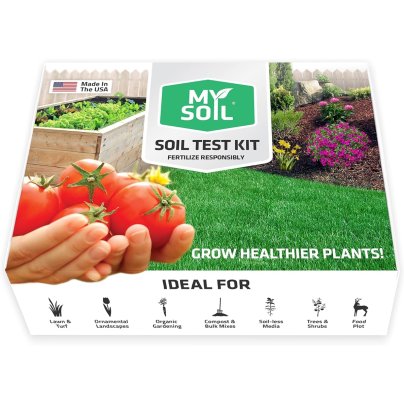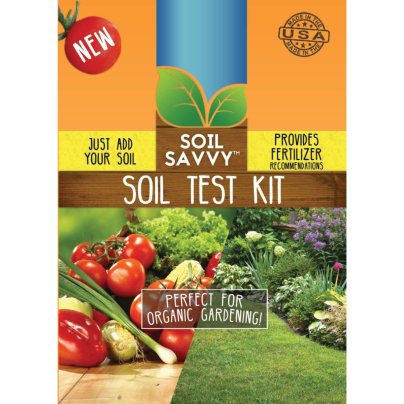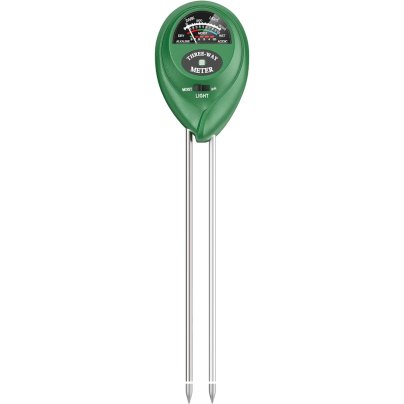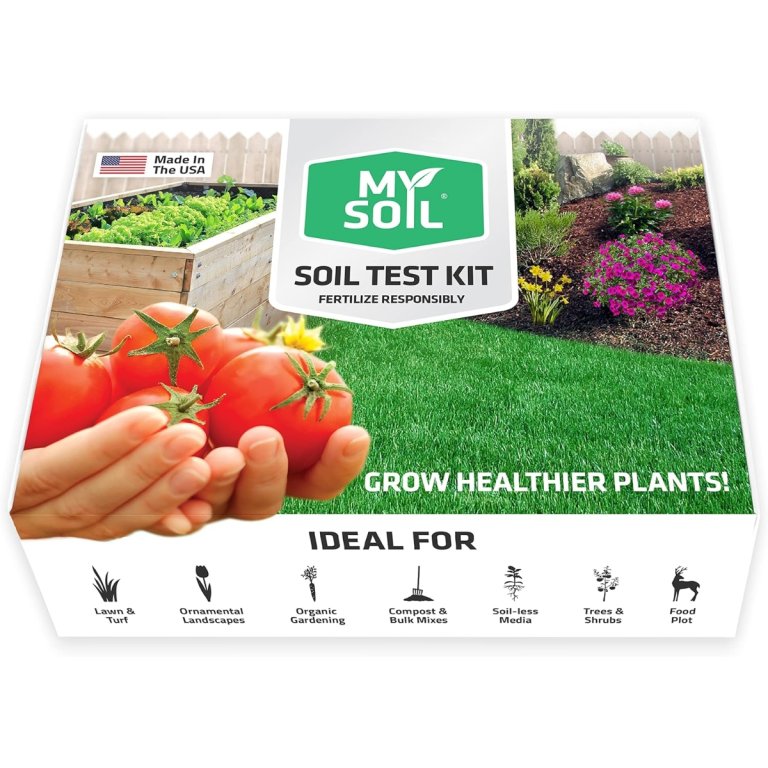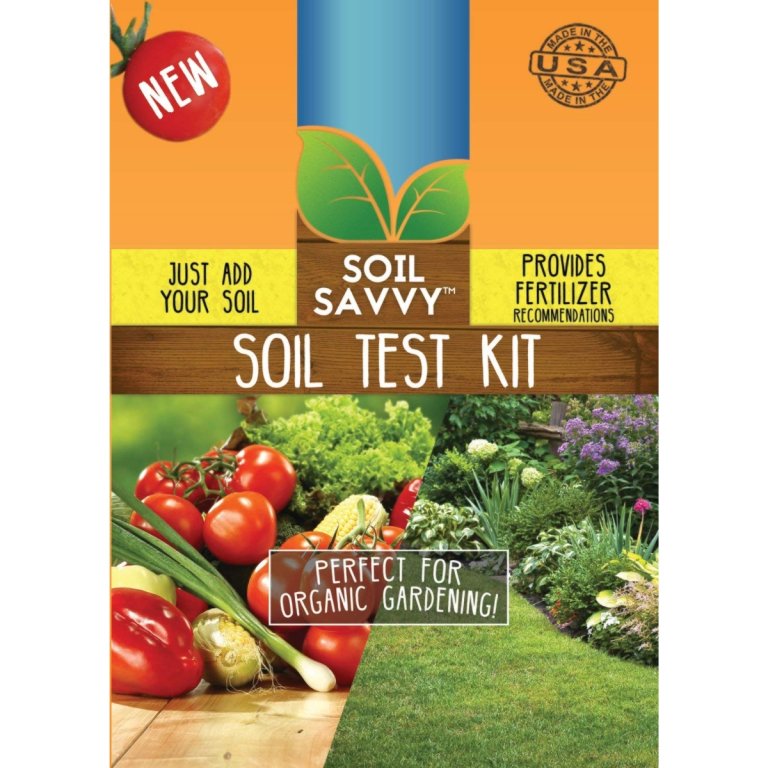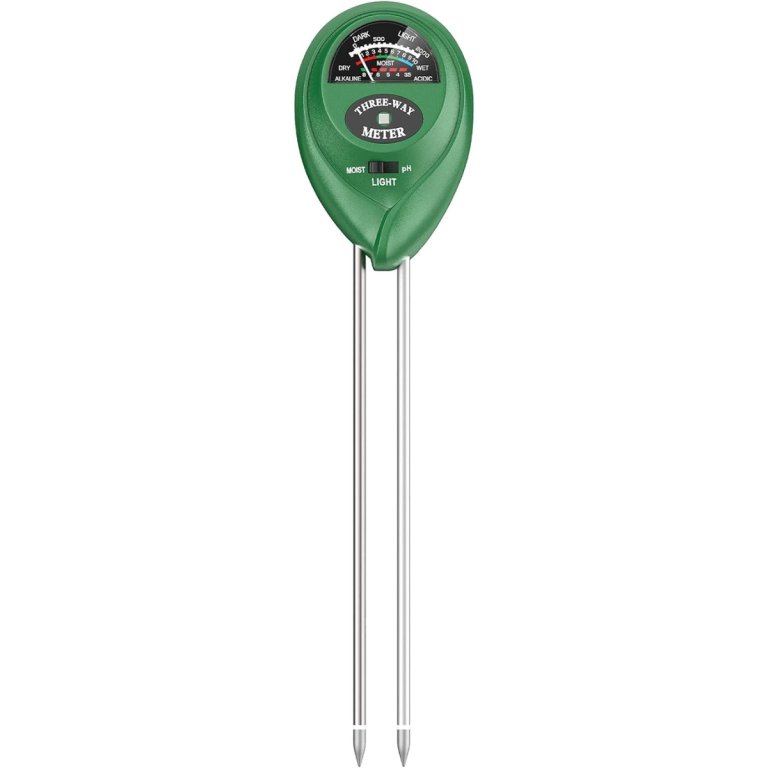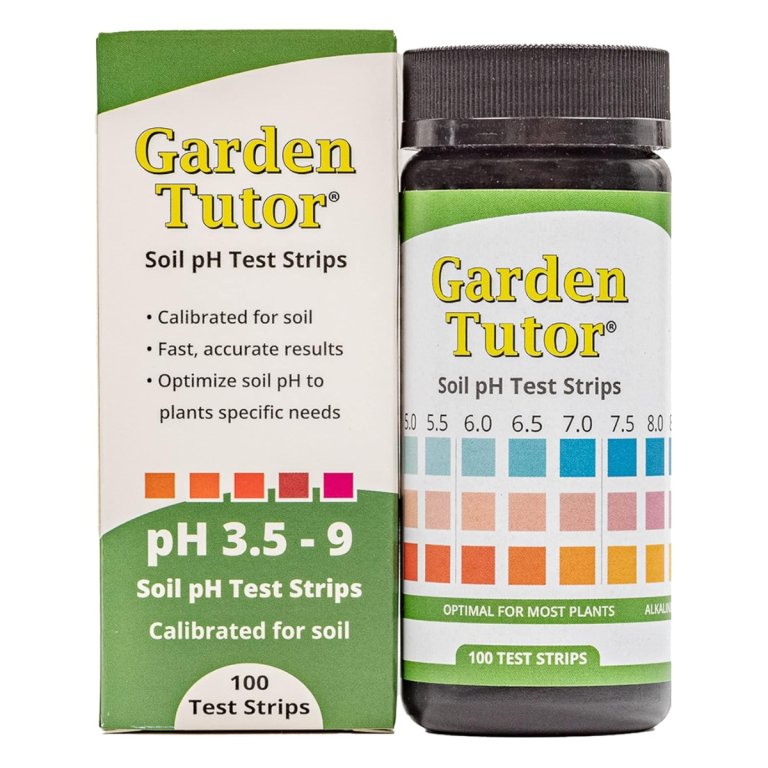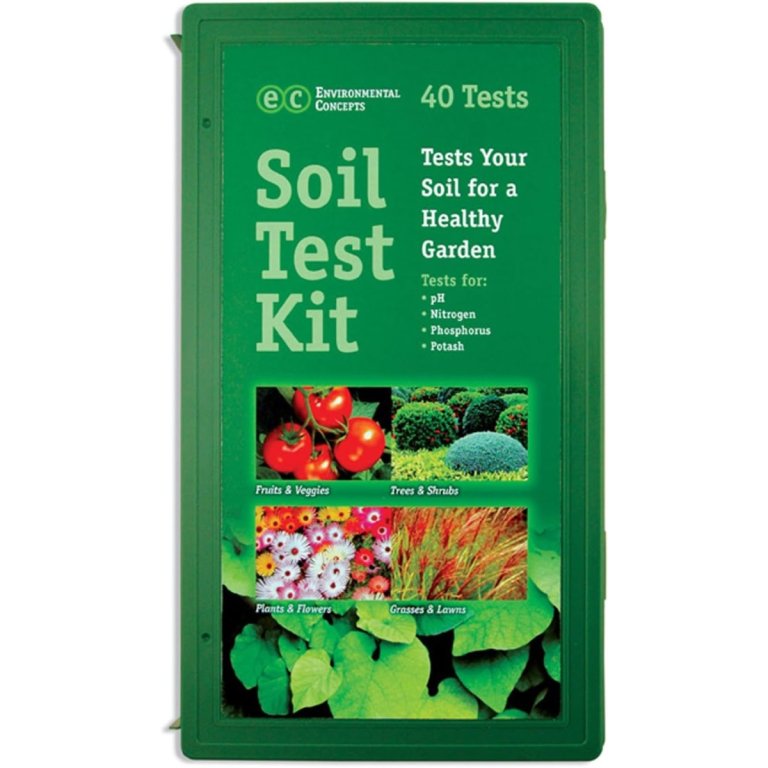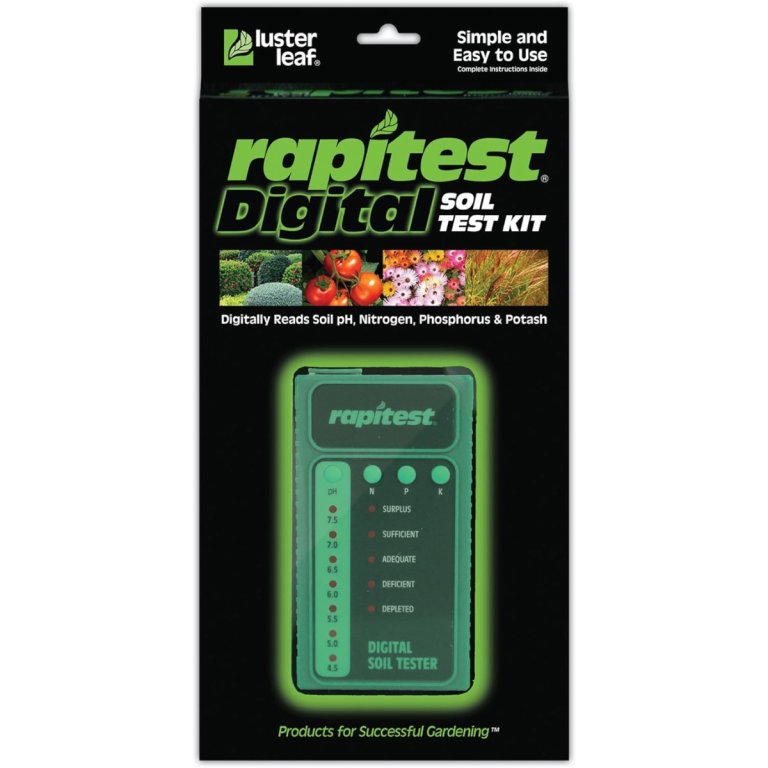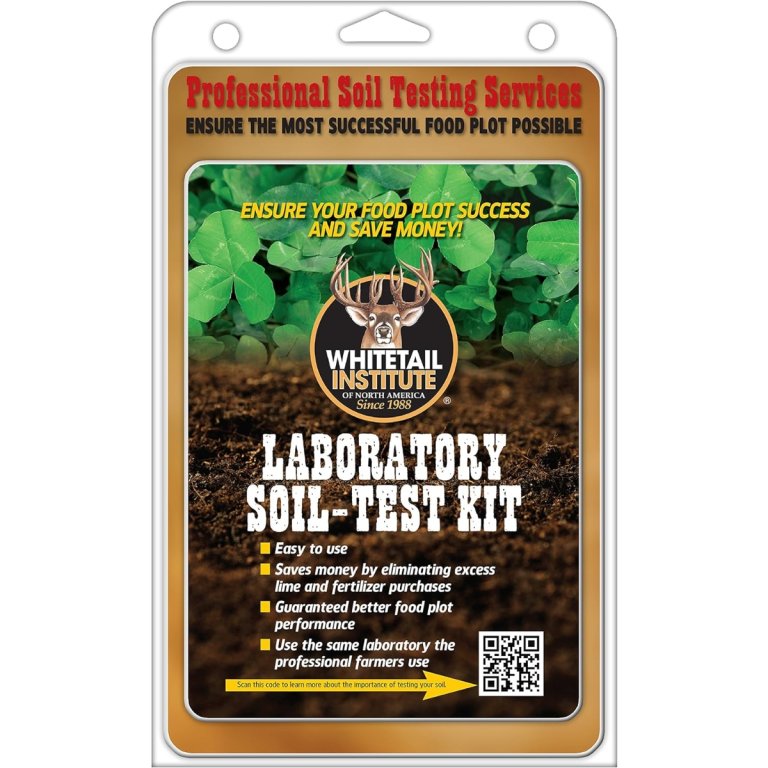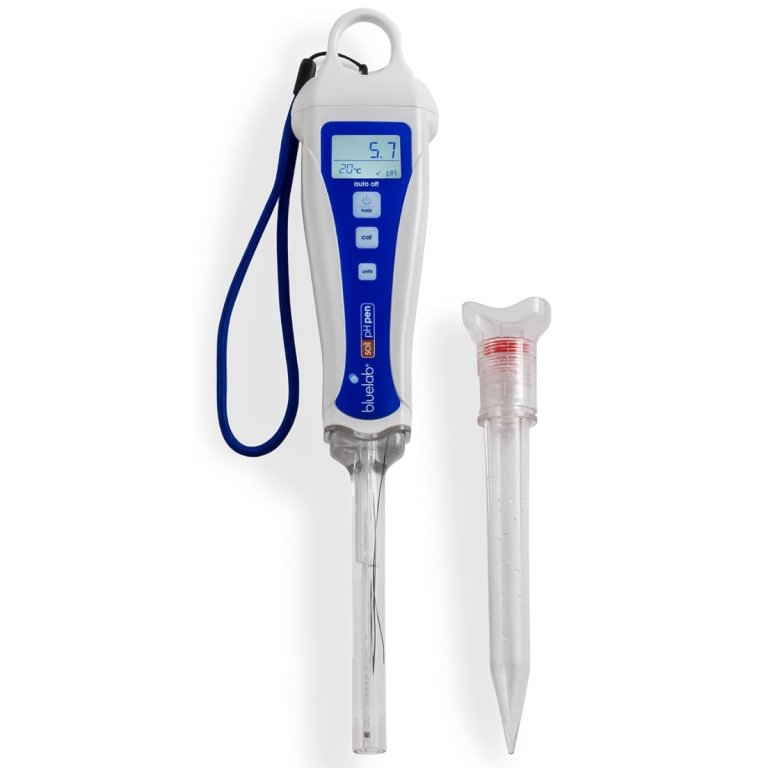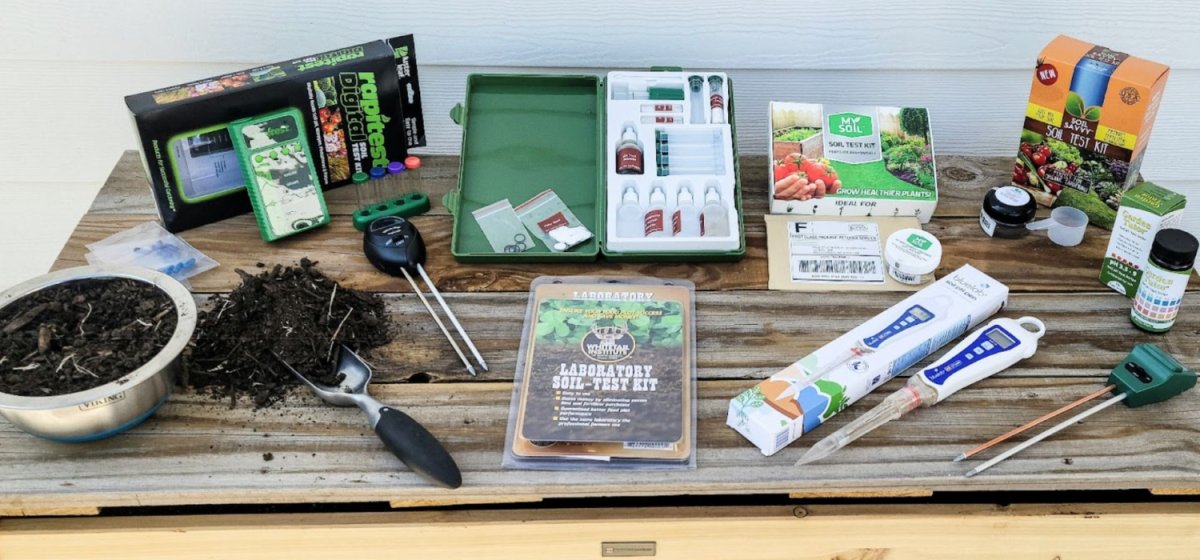
We may earn revenue from the products available on this page and participate in affiliate programs. Learn More ›
Testing garden soil is the best way to determine what it needs—if anything—and how much. A variety of soil testing kits are available, but how reliable are they? Home gardeners rely on these kits when deciding whether to amend their soil, so to narrow down the best soil test kits, we tested for accuracy, dependability, and ease of use.
Soil testers range from simple pH strips to complex kits that pinpoint deficiencies. Serious gardeners will want to reach for comprehensive tests. As Jon Traunfeld, director of the Home & Garden Information Center at University of Maryland, explains, “We recommend that gardeners have their soil tested by accredited soil testing labs, public or private. A basic test that measures soil pH, important soil nutrients, and organic matter costs $20 to $25. The labs also provide recommendations for lime and fertilizer if needed.” These tests are available directly from labs or through your county extension office.
For the average home gardener though, it can be easier to buy a soil test kit online, so that’s what we tested. To ensure accuracy, we compared product results to test results acquired from the Kansas State University soil testing lab. Our favorite product ended up being the MySoil Test Kit—it was easy to use and the results were simple to interpret, and most importantly of all, they were accurate. Ahead, learn what to look for when shopping for a soil test kit, and find out why the following products are well suited for helping determine soil deficiencies.
- BEST OVERALL: MySoil Test Kit
↓ Jump to Review - RUNNER-UP: Soil Savvy Soil Test Kit
↓ Jump to Review - BEST BANG FOR THE BUCK: Atree 3-in-1 Soil pH Meter Tester Kits
↓ Jump to Review - BEST PH STRIPS: Garden Tutor Soil pH Test Strips Kit
↓ Jump to Review - BEST CHEMICAL TEST: Luster Leaf 1662 Soil Test Kit
↓ Jump to Review - BEST DIGITAL TEST: Luster Leaf 1605 Digital Soil Test Kit
↓ Jump to Review - BEST FOR CROPS: Whitetail Institute Laboratory Soil-Test Kit
↓ Jump to Review - BEST PRECISION PH: Bluelab Soil pH Pen
↓ Jump to Review
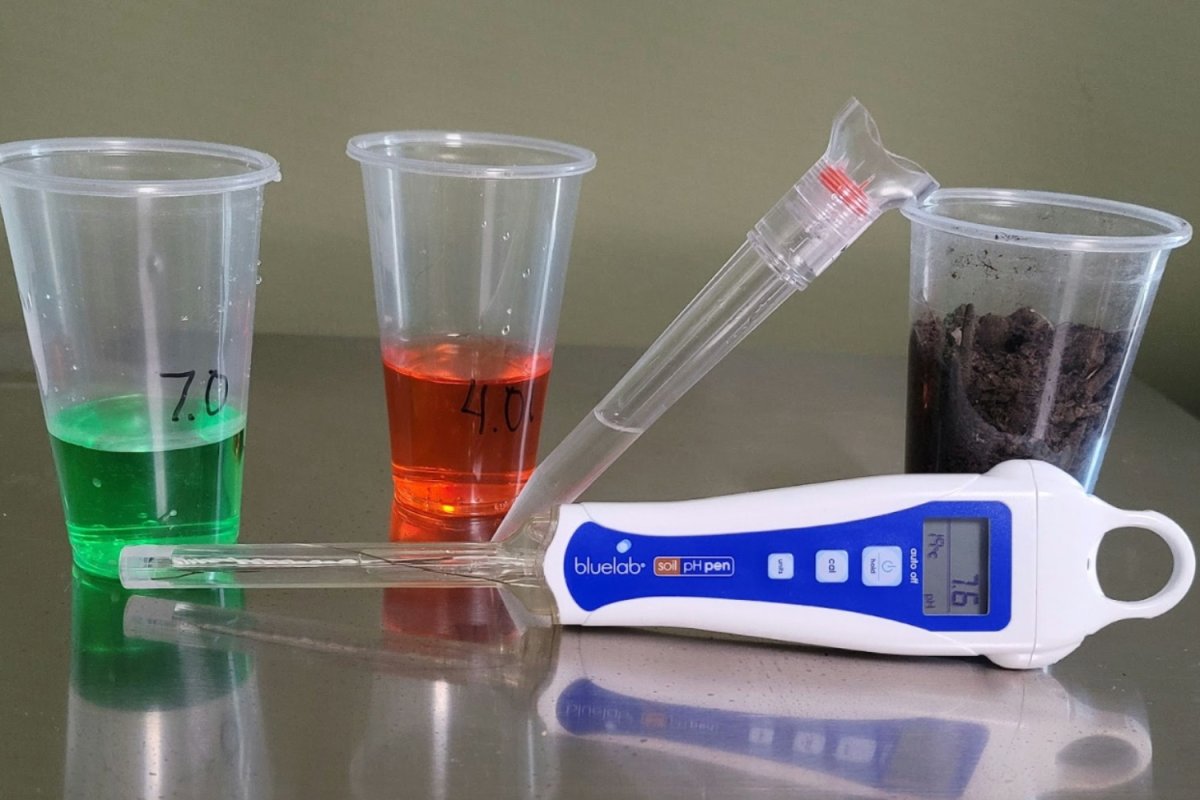
Product Comparison
| Type of Test | Tests For | Result Time | |
| MySoil Test Kit | Professional, mail-in | 13 nutrients plus pH level | Results by email within 6 to 8 days of mailing the sample |
| Soil Savvy Soil Test Kit | Professional, mail-in | 14 nutrients plus pH level | 11 days from when the sample was mailed |
| Atree 3-in-1 Soil pH Meter Tester Kits | Analog probe | Moisture, pH, light | Immediate for moisture and pH, 10 minutes for light |
| Garden Tutor Soil pH Test Strips Kit | Strips | pH levels | Within 20 seconds of testing |
| Luster Leaf 1662 Soil Test Kit | Chemical (at home) | pH, nitrogen, phosphorus, potassium | Varies by the test but all within a few minutes |
| Luster Leaf 1605 Digital Soil Test Kit | Chemical (digital results) | Nitrogen, phosphorus, potassium, and pH | Within a few seconds |
| Whitetail Institute Laboratory Soil-Test Kit | Professional, mail-in | Calcium, magnesium, phosphorus, potassium | Results available by email in one week |
| Bluelab Soil pH Pen | Digital probe | pH and temperature | Immediate |
Our Top Picks
The kits we tested had to be accurate and relatively simple to use to earn a spot on this lineup. Test kits and equipment vary by the type of test being performed, so some are better suited to home gardeners, while others appeal to commercial and agricultural growers. We tested a range of kits—some required mailing off a soil sample for professional analysis, some involved chemical testing at home, and others required nothing more than sticking a probe in the soil.
Best Overall
MySoil Test Kit
See ItWhat We Like
- Professional test for pH and a range of soil nutrients and minerals
- Process is clear and straightforward
- Results are detailed and easy to understand
What We Don’t Like
- No print option available on the website
Product Specs
- Type of test: Professional, mail-in
- Tests for: 13 nutrients plus pH level
- Result time: Results by email within 6 to 8 days of mailing the sample
Our Ratings: Ease of Use 5/5; Accuracy 5/5; Value 5/5
For professional results, check out the MySoil test kit, which allows gardeners to gather soil samples and have them professionally tested. The MySoil kit offers an in-depth analysis, revealing the amounts of micronutrients, NPK, and macronutrients in the tested soil.
With the MySoil kit, we registered online and followed detailed instructions, gathering a large amount of soil from various areas of the property, mixing it together well, and filling the provided testing cup with the soil blend. Then we sent my soil sample to MySoil as well as an additional soil sample to Kansas State University’s agricultural department so we would have a quality comparison.
We received an email 6 days later with the results of the soil tests. We were impressed with the comprehensive results. The lab listed the levels of existing nutrients, including nitrogen, potassium, sulfur, calcium, iron, and more, and then compared our soil’s levels with optimal levels, which were also listed for each nutrient. We also received a bar chart that allowed us to visually compare the results, making them simple to understand.
Best of all, when the soil results from K-State came back, they were very close to the MySoil results, making us feel very comfortable with the quality of the MySoil lab results.
Get the MySoil soil test kit at Amazon or MySoil.
Runner-up
Soil Savvy Soil Test Kit
See ItWhat We Like
- Soil-collection instructions are easy to follow
- Results provide detailed recommendations for both synthetic and organic amendments
- Tests for aluminum, which our top pick does not test for
What We Don’t Like
- Could provide a better explanation of the results
- It took the longest of all labs to get results
Product Specs
- Type of test: Professional, mail-in
- Tests for: 14 nutrients plus pH level
- Result time: 11 days from when the sample was mailed
Our Ratings: Ease of Use 4/5; Accuracy 5/5; Value 5/5
The Soil Savvy soil test kit offers professional soil analysis and custom fertilizer recommendations. It comes with a scoop, a collection cup containing liquid and a plastic ball, a prepaid postage envelope, and complete instructions for collecting and submitting a soil sample.
As with the other soil samples we sent in the mail for professional testing, used the same soil gathered from various spots and then blended well. We spooned the soil into the cup, sealed it, and then went online and registered the barcode that came with the kit.
The lab took a little longer than we’d anticipated to get back to us, but in 11 days, we got an email directing us to log on for my results. We were impressed by the accuracy of the test results—they were right in line with the K-State results, and we also received customized recommendations for amending my soil to make it healthier. The Soil Savvy recommendations were broken down by synthetic and organic fertilizers—telling me exactly how much of each to apply per 1,000 square feet to amend the soil.
Soil Savvy could have provided a better explanation of the results, however. We understand what nutrient ratios are, but a newbie gardener might benefit from further explanation of what the numbers mean. The lab tested for the 14 most common nutrients plus pH level.
Get the Soil Savvy soil test kit at Amazon or Soil Savvy.
Best Bang For The Buck
Atree 3-in-1 Soil pH Meter Tester Kits
See ItWhat We Like
- Very simple to use and provides immediate or near-immediate results
- Doesn’t need batteries
- Low-effort option
What We Don’t Like
- Only measures moisture, pH, and light
Product Specs
- Type of test: Analog probe
- Tests for: Moisture, pH, light
- Result time: Immediate for moisture and pH, 10 minutes for light
Our Ratings: Ease of Use 5/5; Accuracy 5/5; Value 5/5
Not all gardeners need or want a nutritional analysis of their soil. Some just want to know the pH level or how much light a plant would receive in a specific location. The Atree soil pH meter provides those answers accurately and at an affordable price.
We tested the Atree meter by inserting it in various spots in our flower garden. Over the years, we’ve added amendments, such as sulfur, to specific areas where acid-loving plants are growing, and we were curious whether this simple tester would pick up on that. It did—the soil around our hydrangeas, which we’ve amended heavily, tested at 6 on the pH scale, while the soil around our daisies registered at 6.8. Both seemed accurate based on our historical knowledge of our soil and the amendments we’ve made.
We then tested both moisture and light levels in various garden spots, and the Atree again seemed accurate. While this tester didn’t determine things like specific nutrient levels, we found that it would be great for gardeners who are happy with the health of their soil but would like to know if the light is adequate or whether the soil is draining well. The Atree did a good job measuring both.
Get the Atree soil test kit at Amazon.
Best Ph Strips
Garden Tutor Soil pH Test Strips Kit
See ItWhat We Like
- Quick and accurate pH test results
- Simple to use and read
- Includes 100 test strips for lots of testing at an affordable cost
What We Don’t Like
- Poor packaging likely led to short shelf life
Product Specs
- Type of test: Strips
- Tests for: pH levels
- Result time: Within 20 seconds of testing
Our Ratings: Ease of Use 5/5; Accuracy 5/5; Value 4/5
Garden Tutor’s test strips offer quick results in determining indoor or outdoor soil’s acid/alkaline content. The kit contains 100 test strips and also includes a 16-page handbook that lists optimal pH levels for growing various plants.
We found the Garden Tutor soil pH test strips to accurately determine the pH levels in various parts of our flower garden. The simplest of all the kits we tested required mixing soil from a specific garden area with water and then dipping it in a pH test strip. In a few seconds, sensitive tabs on the test strip turned color, and we visually matched them to the color-coded chart on the outside of the bottle to determine the amount of acid or alkalinity of the soil.
We tested the soil in an area we knew had a lower pH, as we’ve added pH-lowering amendments for years. The Garden Tutor test strips determined that level to be 6.1, which sounded close and aligned with other pH tests we performed. We then tested the soil in a spot we knew was more alkaline and got a higher pH reading.
One thing we wish the manufacturer would have included, however, was a moisture-absorbent pack with the strips. We used about 20 strips in our initial tests, and all were fine. Three weeks later, however, the pH pads had all turned brownish, which we suspected was due to moist air getting into the bottle.
Get the Garden Tutor soil test kit at Amazon or Garden Tutor.
Best Chemical Test
Luster Leaf 1662 Soil Test Kit
See ItWhat We Like
- Provided accurate results
- Looks intimidating but it’s relatively easy to use
- No need to send off a sample and wait days for results
- All the components fit into a small kit that’s easy to store
What We Don’t Like
- Did not have enough solution to complete 40 tests
Product Specs
- Type of test: Chemical (at home)
- Tests for: pH, nitrogen, phosphorus, potassium
- Result time: Varies by the test but all within a few minutes
Our Ratings: Ease of Use 4/5; Accuracy 5/5; Value 4/5
In addition to determining soil’s pH level, the Luster Leaf soil test kit pinpoints the amount of the three most common soil macronutrients: nitrogen, phosphorus, and potassium. There’s no need for the user to send a sample to a laboratory with this chemical test.
When we first opened the Luster Leaf test kit case, we were surprised by the number of vials and bottles of solutions. It didn’t look very easy. After reading the instructions, we found it was actually pretty simple. Testing involved gathering soil, putting a tiny bit in a glass vial, adding a specific liquid and/or powder (depending on the test), and shaking the vial. We were then able to compare the color of the liquid in the vial to an included chart to get the results.
To determine the accuracy of the Luster Leaf tests, we compared the results we got from the mail-in soil tests. The NPK results were close to the lab results. For an at-home test, we were pretty impressed. (The pH, on the other hand, tested lower than the lab tests, but the soil where we took the sample for this test had been previously amended to lower pH.)
The downside? The manufacturer says the kit will perform 40 tests. We found that to be inaccurate. We followed the instructions carefully and had only enough solution to do about 15 tests.
Get the Luster Leaf 1662 soil test kit at Amazon.
Best Digital Test
Luster Leaf 1605 Digital Soil Test Kit
See ItWhat We Like
- Digital results are straightforward and very easy to interpret
- Testing just requires inserting the sample and pressing a test button
- Includes a booklet that has pH preferences for over 450 plants
What We Don’t Like
- Only 5 capsules per test for nitrogen, phosphorus, and potash
Product Specs
- Type of test: Chemical (digital results)
- Tests for: Nitrogen, phosphorus, potassium, and pH
- Result time: Within a few seconds
Our Ratings: Ease of Use 4/5; Accuracy 5/5; Value 4/5
The second Luster Leaf kit in the lineup tests for nitrogen, phosphorus, and potassium, but it takes some of the complexity out of testing using color-coded capsules. It also takes the guesswork out of matching the results with its easy-to-read digital display. Everything is color-coded: N, P, and K correspond with purple, blue, and orange, respectively, while green is for pH.
We collected a soil sample, filled one of the four test tubes, and then added filtered water to the tube. We shook the soil and water solution, inserted a color-coded capsule in the vial, and shook again. Once the contents were well mixed, we inserted the vial into the hole at the top of the digital reader and pressed the button corresponding to the test.
This was the same test as the first Luster Leaf kit, but it was more user-friendly, and the color-coding made everything understandable. The digital reader gave me the results via a lit-up button. If the soil had too much of a nutrient, it registered as “surplus,” and lower amounts registered as “sufficient,” “adequate,” “deficient,” or “depleted.”
Unfortunately, the digital tester did not show how low or high a nutrient might have been, but we were able to look in the booklet and see optimal NPK levels for different plants, grasses, and flowers. The booklet also offered suggestions on how to amend the soil to raise or lower specific nutrient levels.
Get the Luster Leaf 1605 soil test kit at Amazon or Earth Easy.
Best For Crops
Whitetail Institute Laboratory Soil-Test Kit
See ItWhat We Like
- Ideal for food plots
- Customizable—write down the intended crop for personalized results
- Detailed results arrive quickly and are tailored to the chosen crop
What We Don’t Like
- Less comprehensive than some other tests
Product Specs
- Type of test: Professional, mail-in
- Tests for: Calcium, magnesium, phosphorus, potassium
- Result time: Results available by email in one week
Our Ratings: Ease of Use 5/5; Accuracy 5/5; Value 4/5
Hobby farmers and crop growers can receive an expert soil analysis with the Whitetail Institute’s Laboratory soil test kit. Growers also receive a custom consultation and recommendations for improving their soil based on the type of crop that will be grown.
For testing, we once again used the same soil gathered from various spots, blended well, and sent the sample to Whitetail. Of the three mail-in soil kits we tested, Whitetail offered the highest level of customization. When we filled out the form, they asked what we planned to grow in the soil. We chose alfalfa and Whitetail sent specific instructions for amending the soil to make it suitable for growing alfalfa.
The nutrient test results were very close to those we obtained from the other labs and Kansas State University, but Whitetail only tested for four nutrients: phosphorus, potassium, calcium, and magnesium. We called the local extension agent and asked why. He said those are the most critical four nutrients for most agricultural crops.
We could access the test results in just one week, and a few days later, a paper copy arrived via snail mail. We found that the Whitetail test kit results would be a boon for farmers or hobby farmers who want to create optimal soil conditions for a specific crop.
Get the Whitetail Institute soil test kit at Amazon, Cabela’s, or Whitetail Institute.
Best Precision pH
Bluelab Soil pH Pen
See ItWhat We Like
- Provides very precise pH testing, measuring to 0.1 degree
- Easy-to-see digital readout on a backlit LCD display
- Developed for commercial growing needs
What We Don’t Like
- Must be calibrated before use
Product Specs
- Type of test: Digital probe
- Tests for: pH and temperature
- Result time: Immediate
Our Ratings: Ease of Use 3/5; Accuracy 5/5; Value 4/5
For commercial-scale growers, hydroponic growers, or gardeners who want the ultimate in precision pH testing, consider the Bluelab pH pen that provides highly accurate acid/alkaline results. The pen comes with a backlit LCD display and requires a AAA battery for operation. It also features two-point calibration for ensuring accurate pH readings, but the calibration solution is not included.
We had to locate 7.0 and 4.01 pH solutions, and we were able to borrow some of both from the local high school chemistry class, but be aware that if you want to use this pen, you’ll need to buy some of your own.
After calibrating the Bluelab pen, which involves putting it first in one solution and then the other and pushing the calibration button each time, we were able to test the pH and the temperature of the soil of our potted plants. We were surprised at the accuracy of this pen tester as it measured pH to a tenth of a degree and clearly displayed the number on the LED screen. The pH was close to what we had gotten in other tests, but this seemed to be the most accurate of all the tests. The temperature reading was also handy, and it would be vital for hydroponic growers or commercial growers who needed to maintain a specific growing temperature.
Get the Bluelab soil test pen at Amazon or Bluelab.
Jump to Our Top Picks
How We Tested the Best Soil Test Kits
| Testing Stats | |
| Products tested | 9 |
| Time spent testing | 18 hours |
| Tests performed | 9 |
| Price range | $10 to $200 |
Our goal in testing the soil test kits was to determine how accurate each was, how easy they were to use, and how beneficial the results would be for our readers. The types of soil tests varied widely—from professional tests that required sending a soil sample to a lab to simple pH meters that determined a soil’s acid or alkaline level via a probe. We extensively researched dozens of soil test kits and products before choosing which ones to test, and we intentionally chose different types of kits because growers have very different needs.
Misti Mathis, co-owner of Harvest Gold Organics, which sells plant care products out of McKinney, Texas, offers some advice on how shoppers can decide between kits: “Ultimately, the best choice depends on your specific needs and budget. While home test kits won’t be as precise as professional labs, they’re a good option for many gardeners.” She adds that “a professional lab test might be a better choice if you’re facing severe plant growth issues or have unique soil characteristics.”
To help determine the effectiveness of individual lab tests, we also sent a soil sample to the agricultural department at Kansas State University, where they do high-end soil and plant testing. The results from Kansas State were used as a starting point for comparing the other lab tests and the at-home chemical testing kits.
We awarded points for each kit or product, and at the end of testing, we added the points and used them to help determine the best uses and specific awards for each of the kits that earned a spot in this lineup.
What to Consider When Choosing a Soil Test Kit
Many gardeners and home landscapers buy fertilizer and soil amendment products that promise to produce robust plant growth, improve soil structure, or result in abundant blooms. Still, unless the products provide what the soil lacks, the results may not be what the gardener expected. In some cases—such as adding fertilizer to nutrient-dense soil—plants may even suffer from fertilizer burn. Soil testing takes the guesswork out of gardening and landscaping, and that’s why I tested the top soil test products on the market today.
Soil
Soil quality varies from location to location. The soil in some regions might be perfect for growing vegetables and flowers, while the soil someplace else must be heavily amended with organic matter to grow anything. The following four common types of soil have different properties:
- Silt: Fine and soft, silt grains are smaller than grains of sand. Silty soil is associated with prior flooding that washed topsoil downstream. Silty soils are suitable for growing most types of plants but will benefit from adding organic matter to help increase drainage. Depending on its nutrient content, silt may also require a fertilizer.
- Loamy: An optimal blend of silt, sand, clay, and organic matter, loamy soil is a gardener’s best friend. It drains well, yet resists compaction as it dries out. It’s suitable for growing fruits, vegetables, and most types of flowers and shrubs.
- Clay: While clay soil is full of nutrients, it’s composed of ultra-fine particles that stick together when wet and become rock-hard when dry. Plants don’t grow well in clay soil because their roots can’t push as easily through thick clay as they can with other soil types. Clay soil must be amended with organic matter, such as compost, to help aerate the soil and make it suitable for growing plants.
- Sandy: Better than clay because it offers spaces between the grains for roots to grow, but not as nutrient-dense as loam, sandy soil drains well. It is suitable for growing bulbs, such as tulips, and root crops, including potatoes and carrots. When preparing soil for the upcoming growing season, adding organic matter will help it retain moisture when growing other types of plants.
Test Types
Several soil-testing products are available to determine the amounts of various nutrients and macronutrients in the soil. Among the most comprehensive tests are those that involve taking soil samples and sending them to a lab for analysis. Still, at-home kits and instruments like these can be of help.
- Strips: A simple type of soil test, pH strips are coated bits of paper that determine the current acidity or alkalinity level of the soil. The gardener mixes soil with distilled water, using the recommended ratio on the package instructions. (Tap water can influence the pH readout.) After inserting the test strip in the solution, the resulting color of the strip lets the gardener know whether the soil in the garden is acidic or alkaline. A chart usually comes with pH test strips so users can compare the colors.
- Analog: These testers are commonly used to test soil for moisture content, pH levels, and some may even test the quantity of the light in specific locations. They feature aluminum probes to be inserted in the soil when taking readings. Some may use batteries, but many analog testers react to wetness in the ground and often don’t need batteries.
- Digital: Like analog soil testers, digital soil testers often come with probes to insert in the ground to determine moisture content and pH levels. They usually require batteries and may also be used in conjunction with chemical testing to help determine nutrient levels, such as the amount of nitrogen or potash in the soil.
- Chemical: At-home chemical soil tests require adding a drop or two of a specific chemical called a “reagent” to a soil sample. The reaction helps show the health of the soil. Chemical soil tests are suitable for testing one or more factors, including pH, and specific nutrients, such as nitrogen or calcium.
- Professional: The most reliable of all soil tests, professional tests require the gardener to collect a soil sample. The sample is mailed to a laboratory, where it’s analyzed for structure and a variety of nutrients. Then the lab sends the results and soil recommendations back to the gardener.
Testing
Testing kits and instruments commonly help pinpoint soil characteristics. Knowing the makeup of the soil helps you better maintain your garden. Keep in mind that various plants have specific nutrient requirements, so it’s essential to research the plant that will be grown before adding nutrients.
- Macronutrients: The three most common macronutrients needed for healthy plant growth are nitrogen (N), phosphorus (P), and potassium (K). Every bag of fertilizer will list an NPK number that identifies the amount of each of these three nutrients. The types of N, P, and K nutrients come in various forms, such as potassium carbonate for phosphorus, and urea or anhydrous ammonia for nitrogen. In general, all the NPK varieties perform similar functions. The key is knowing which specific nutrient that a plant needs and then using the soil test results to add a fertilizer formulation that helps balance nutrient levels.
- Micronutrients: Plants may require trace minerals as well as macronutrients, and a soil tester that pinpoints micronutrients, such as copper, iron, and manganese, tells the gardener if too much or not enough of these nutrients is in the soil.
- Acid or alkaline: The pH scale runs from 0 to 14, with 7 being neutral. Most garden plants prefer slightly acidic soil, between 6 and 7. However, some plants such as lilac and clematis prefer slightly alkaline soils, while azaleas prefer acidic (5.5) conditions.
- Temperature: Testing soil temperature is much like testing human temperature; the tester has a thermometer that indicates how warm or cool the soil is. This is helpful for commercial growers who want to start production as early in the spring as possible. It also can be helpful for hobby gardeners who want to make sure the soil is warm enough before they set out seedlings.
- Light: Because plants need various amounts of light, a light meter can help determine whether a location will be optimal for a specific plant variety. While plants have different light needs, all need some light for photosynthesis, which is how the plant synthesizes water and carbon dioxide into food. Most at-home light meters will display low, medium, and high lighting conditions. A gardener can use these readings to determine whether a plant is receiving enough light (or too much light) in a specific spot.
- Moisture: One of the most common soil tests is for moisture, and it’s used to determine whether the soil is draining well. Moisture meters usually have a gauge that allows the gardener to see if the soil, whether it’s in a garden bed or is a potting soil mix, is dry, moist, or wet.
Accuracy
Soil test kits vary in accuracy, with professional lab tests ranking as the most accurate. The quality and composition of the soil may also vary from one end of the garden to the other based on the amount of light that a specific spot gets, whether leaves fall and decompose in one spot, or what types of plants were grown there in the past. For example, plants in the legume family, such as soybeans or clover, can add nitrogen to the soil.
Choosing the most accurate test or tester can prove challenging, but look for features such as large, easy-to-read gauges on analog testers and probes that are solidly attached. Chemical kits should offer multiple testing processes for double-checking results, and pH test strips will be most accurate before their expiration date. No matter the individual test kit, gardeners can help avoid mistakes by performing multiple tests in different spots.
Speed of Results
The quickest results come from tests that determine pH and moisture. At-home test kits and instruments can determine these two factors in mere seconds. Testing for other nutrients may take longer, especially if the soil has to be combined with water and then allowed to settle before performing a chemical test.Light and moisture meters can often determine results in a few minutes. Retesting can be done as often as desired to get an idea of light quality during different times of the day and to see whether moisture evaporates more quickly from soil during higher outdoor temps.
The longest wait period comes when seeking professional laboratory results. The gardener must gather the soil samples, place them in a package, and mail the package to the laboratory. Depending on the speed of the lab, it may take a few days to test the sample and then a few extra days to get the results. Some labs can send results by email, which speeds up the process by a couple of days.
Ease of Use
Test kits that feature pH strips and meters with probes are simple to use and self-explanatory for the most part, but the best soil test kits come with directions on how to handle the strips and the probes, in addition to offering information for understanding the relevance of the test results. Chemical test kits can be more complex, but they come with instructions on gathering soil samples, mixing them, and choosing the chemicals to use when conducting specific nutrient tests. Chemical kits often come with charts that explain what the different results mean, such as various color changes that occur when testing for particular macronutrients and micronutrients.
FAQs
The best soil test kit can help a gardener figure out the most beneficial fertilizers or amendments to add to a garden. Below are answers to some common questions about soil testing kits.
If plants are thriving, there’s no need to test the soil. However, if plants seem to wilt, die, or just do poorly, testing the soil could help determine if the problem is due to a structure or nutrient deficiency in the soil.
Absolutely. Many DIY-type soil testers are available for testing everything from moisture and pH to the amount and type of nutrients in the soil. Some involve sending the soil sample to a professional lab—these can yield the most accurate results.
Digital soil testers are usually reasonably accurate. Gardeners can increase accuracy by performing multiple tests in different spots of the garden and comparing the results.
There are several soil testing methods. Soil test kits you can buy for at-home use feature pH strips, analog or digital meters, and chemical testing. They will include directions for the testing method. Professional testing is available by sending soil samples to a lab—you mail in a soil sample and they’ll provide results within a few days or weeks.
A pH test measures the acidity and alkalinity levels of the soil. The acidity of the soil can affect plant health, including how well it absorbs nutrients, so aiming for the ideal pH level for your plant types is one important step toward a flourishing garden.
Soil treatments are available that will either raise or lower the soil’s pH level, depending on what the gardener is growing. These are often called pH-UP and pH-DOWN products. You can also use amendments like garden lime and bone meal (which increase soil pH) and peat moss or sulfur (which lower soil pH) to naturally adjust pH levels in your garden.
Kits with pH strips may expire in a few months, especially if they’re not kept in an airtight container. Meters and monitors will not expire. However, if they’re battery operated, they will require new batteries when the old ones run down. Chemical kits are often good for 2 to 5 years.
Meet the Tester
Glenda Taylor is a product tester and writer specializing in the construction, remodeling, and real estate industries. She and her husband own a general contracting company, and Taylor is experienced in both residential and commercial building applications. She tests a wide range of power tools as well as other home improvement, household, and lawn-and-garden products.
